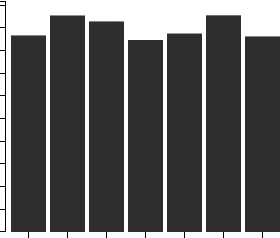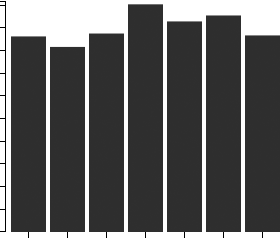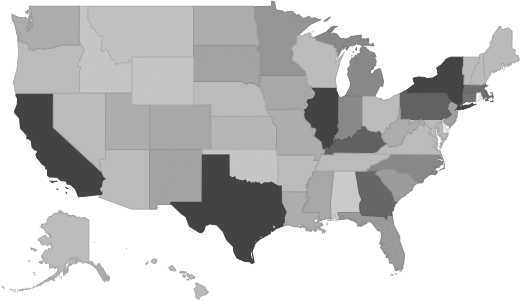Scheduled Passenger Air Transportation - Market Size, Financial Statistics, Industry Trends
Industry Overview
This U.S. industry comprises establishments primarily engaged in providing air transportation of passengers or passengers and freight over regular routes and on regular schedules. Establishments in this industry operate flights even if partially loaded. Scheduled air passenger carriers including commuter and helicopter carriers (except scenic and sightseeing) are included in this industry. Cross-References. Establishments primarily engaged in--Source: U.S. Census Bureau
Scheduled Passenger Air Transportation Market Size
This report includes historical and forecasted market sizes and industry trends for Scheduled Passenger Air Transportation. It reveals overall market dynamics from 2021 through the present, and predicts industry growth or shrinkage through 2031. Revenue data include both public and private companies in the Scheduled Passenger Air Transportation industry.| Historical | Forecasted | ||||||||||
|---|---|---|---|---|---|---|---|---|---|---|---|
| 2021 | 2022 | 2023 | 2024 | 2025 | 2026 | 2027 | 2028 | 2029 | 2030 | 2031 | |
| Market Size (Total Revenue) | Included in Report |
||||||||||
| % Growth Rate | |||||||||||
| Number of Companies | |||||||||||
| Total Employees | |||||||||||
| Average Revenue per Company | |||||||||||
| Average Employees per Company | |||||||||||
Industry Revenue ($ Billions)

Industry Forecast ($ Billions)

Pell Research's advanced econometric models forecast five years of industry growth based on short- and long-term trend analysis. Market size statistics include revenue generated from all products and services sold within the Scheduled Passenger Air Transportation industry.
Geographic Breakdown by U.S. State
Scheduled Passenger Air Transportation market share by state pinpoints local opportunities based on regional revenue statistics. Growth rate for each state is affected by regional economic conditions. Data by state can be used to locate profitable and nonprofitable locations for Scheduled Passenger Air Transportation companies in the United States.Industry Revenue by State

Distribution by Company Size
| Company Size | All Industries | Scheduled Passenger Air Transportation |
|---|---|---|
| Small Business (< 5 Employees) | Included |
|
| Small Business (5 - 20) | ||
| Midsized Business (20 - 100) | ||
| Large Business (100 - 500) | ||
| Enterprise (> 500) | ||
Industry Income Statement (Average Financial Metrics)
Financial statement analysis determines averages for the following industry forces:- Cost of goods sold
- Compensation of officers
- Salaries and wages
- Employee benefit programs
- Rent paid
- Advertising and marketing budgets
The report includes a traditional income statement from an "average" Scheduled Passenger Air Transportation company (both public and private companies are included).
| Industry Average | Percent of Sales | |
|---|---|---|
| Total Revenue | Included |
|
| Operating Revenue | ||
| Cost of Goods Sold (COGS) | ||
| Gross Profit | ||
| Operating Expenses | ||
| Operating Income | ||
| Non-Operating Income | ||
| Earnings Before Interest and Taxes (EBIT) | ||
| Interest Expense | ||
| Earnings Before Taxes | ||
| Income Tax | ||
| Net Profit | ||
Average Income Statement

Cost of Goods Sold
Salaries, Wages, and Benefits
Rent
Advertising
Depreciation and Amortization
Officer Compensation
Net Income
Financial Ratio Analysis
Financial ratios allow a company's performance to be compared against that of its peers.| Financial Ratio | Industry Average |
|---|---|
| Profitability Ratios | Included |
| Profit Margin | |
| ROE | |
| ROA | |
| Liquidity Ratios | |
| Current Ratio | |
| Quick Ratio | |
| Activity Ratios | |
| Average Collection Period | |
| Asset Turnover Ratio | |
| Receivables Turnover Ratio | |
| Inventory Conversion Ratio |
Products and Services Mix
Product lines and services in the Scheduled Passenger Air Transportation industry accounting for the largest revenue sources.| Product Description | Description | Revenue ($ Millions) |
|---|---|---|
| Industry total | Included |
|
| Domestic, scheduled passenger transportation by air | ||
| Domestic, scheduled passenger transportation by air, coach class | ||
| International, scheduled passenger transportation by air | ||
| International, scheduled passenger trans by air, coach class | ||
| Domestic, scheduled passenger trans by air, first and bus class | ||
| Intl, scheduled passenger trans by air, first class and bus class | ||
| Air transportation related services, nec | ||
| Other air transportation related services, nec | ||
| International, scheduled freight transportation by air | ||
Compensation and Salary Surveys
Salary information for employees working in the Scheduled Passenger Air Transportation industry.| Title | Percent of Workforce | Bottom Quartile | Average (Median) Salary | Upper Quartile |
|---|---|---|---|---|
| Management Occupations | 2% |
Included |
||
| Chief Executives | 0% | |||
| General and Operations Managers | 0% | |||
| Office and Administrative Support Occupations | 27% | |||
| Information and Record Clerks | 21% | |||
| Reservation and Transportation Ticket Agents and Travel Clerks | 19% | |||
| Reservation and Transportation Ticket Agents and Travel Clerks | 19% | |||
| Installation, Maintenance, and Repair Occupations | 9% | |||
| Vehicle and Mobile Equipment Mechanics, Installers, and Repairers | 7% | |||
| Aircraft Mechanics and Service Technicians | 7% | |||
| Aircraft Mechanics and Service Technicians | 7% | |||
| Transportation and Material Moving Occupations | 58% | |||
| Air Transportation Workers | 44% | |||
| Aircraft Pilots and Flight Engineers | 17% | |||
| Airline Pilots, Copilots, and Flight Engineers | 17% | |||
| Flight Attendants | 26% | |||
| Flight Attendants | 26% | |||
| Material Moving Workers | 9% | |||
| Laborers and Freight, Stock, and Material Movers, Hand | 8% | |||
Government Contracts
The federal government spent an annual total of $22,790,959 on the Scheduled Passenger Air Transportation industry. It has awarded 306 contracts to 27 companies, with an average value of $844,110 per company.Top Companies in Scheduled Passenger Air Transportation and Adjacent Industries
| Company | Address | Revenue ($ Millions) |
|---|---|---|
Included |
||
